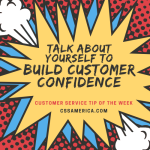The customer is often the ultimate supplier of the information we need to help them. So, we want customers to be open with us, to share their feelings, goals, issues, perceptions.
Building trust is a long-term enterprise, but many of us don’t have much time with the customer. However, we still need the customers to be open enough to share with us so that we can be most effective in helping them. Here are some keys to building trust in those short but important moments of truth…
Speak to what they’ve said. The most important action is listening – asking the questions to get the information we need. Most of the keys below are about what we say or what we convey, but it all starts with what we hear.
Speak with intent. We need to be intentional about what we say. Tossing in unclear words or commitments, having a tone that lacks confidence, making promises or sharing stories that don’t relate to what the customer conveyed can cause the customer to lose our main point. It can cause them to think they haven’t been heard; they can lose confidence and trust.
Note what you can do by illustrating what you have done. For customers to have faith that we can help, tell them what we can do, but it strengthens the story to tell them what we have done with others. If we can illustrate a potential resolution that will be done for them by noting similar action taken for somebody else, it helps to build their trust and confidence.
Be open to engender openness. If we want them to be open, we need to be open. It’s hard to get somebody to share if they don’t feel like we’re willing to do likewise. So, if you have questions that you need answered on their behalf, tell them that you need to investigate. If you’re not 100% certain of the best option, tell them, and also let them know what you’re going to do to close that confidence gap.
Do what you said you will do. Finally, so many of us judge trust based on whether or not the person did what they said they’d do. This requires three things. First, be clear with them on what we promised. This may include sending them follow-up messages to reinforce what we have verbally stated. Second – obviously – do what we said we would do. Third, tell them what we did. Action is only as strong as the customer’s recognition that the action we promised actually occurred.
Tap into these 5 keys to build trust in that moment of truth.
Signup for FREE Tips! Contact Us More Resources for You Visit Our Home Page
























